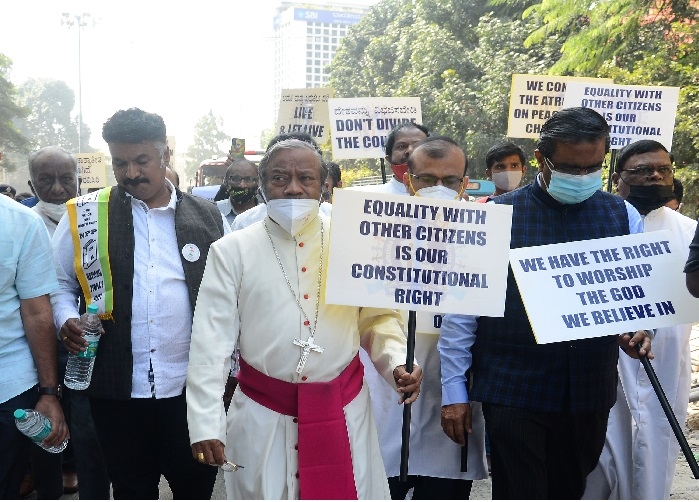
Anti-conversion bill tool for vigilantes?
Hundreds of protestors gathered at Mysore Bank Circle on Wednesday morning to speak out against the controversial Anti-conversion bill, which is being discussed in the Karnataka Assembly this week. The proposed bill seeks to put an end to ‘unlawful conversions’, done through fear or the promise of material gains or marriage. Minority communities, however, fear that this is just a way to clamp down on their religious rights, with organizations affiliated to Churches put under the scanner. On the other hand, making sure that conversions are declared will ensure that government benefits and subsidies are not misused. Darshana Ramdev reports.
On Tuesday, a massive uproar erupted in the Karnataka Assembly, when the BJP government tabled the Karnataka Protection of Right to Freedom of Religion Bill, 2021. The state’s Congress party chief D.K. Shivakumar made no attempt to hide his displeasure, ripping up a copy of the draft during the session. He refused to apologize, calling the bill ‘unconstitutional’. He promised that his party will ‘oppose it tooth and nail’.
Informally referred to as the ‘anti-conversion bill’, the proposed legislation has been criticised by the opposition, religious leaders from minority groups and activists. Among the protestors Wednesday morning was Archbishop Peter Machado from the Bangalore Archdiocese, who held a placard which read ‘Equality with other citizens is our Constitutional Right’. The Christian community wasn’t alone. Other minorities are up in arms, too, including the Islamic community and women’s rights activists who fear that a woman’s freedom to choose a spouse is being curtailed.
The bill, according to a copy of the draft possessed by News Trail, is to “provide for protection of right to freedom of religion and prohibition of unlawful conversion from one religion to another by misrepresentation, force, undue influence, coercion, allurement or by any fraudulent means.” The draft defines “allurement” as ‘temptation in the form of gifts, money, material benefits, free education or the promise to marry’. Being detrimental towards the rituals and ceremonies of one religion or glorifying one over another are also ‘unlawful’ means of conversion. The proposed bill is applicable across religions but minority communities worry that this will only remain on paper.
The anti-conversion bill has been widely perceived as harmful to religious minorities, the Christian community in particular, who fear that it will restrict their freedom to practice and propagate their religion. Educational institutions, which often provide subsidies to poor students and charities run by religious groups will also be under the scanner. “It is a big blow to us. Even gatherings outside the Church premises, even at someone’s house, are being seen as suspect. What’s more, if the person accused of unlawful conversion cannot prove his innocence, he will have to pay Rs 5 lakh to the victim.
“The bill shows that we are not trusted despite all that we have done,” Archbishop Machado told News Trail on Wednesday. “However, we do have faith in the legislators, including those who belong to the BJP. We are trying to convince them it is a step backwards here in progressive Karnataka.” The Archbishop, who has been on the frontlines of the opposition to the bill, has met with legislators and also with the Chief Minister over the last few weeks appealing to them to hold back the bill, which he says “is a big blow to us. It shows that we are not trusted despite all that we have done,” the Archbishop said. He emphasised that they do not support forced conversion. ‘’If I hear of even one case, I will take the strongest action and there are sections of the Indian Penal Code under which it can be done. There is no need for this kind of law, it makes us feel like we are being criminalised.”
Arming the vigilantes?
The other worry is that the bill, if it becomes a law, will give license to vigilantes, who will use the law, should it come into force, as their license to ‘stop conversions’. These acts of vigilantism have become almost commonplace across the state, with 37 incidents of violence and threats against the Christian community in Karnataka between January and November 2021, according to a report by the Evangelical Fellowship of India. “The frequency of incidents has increased, especially after the announcement of the tabling of the anti-conversion law and reporting of the survey on Churches,” the report notes.
“The bill provides very broad definitions of what ‘conversion’ means, just like UP’s anti-conversion law,” says Robin Christopher, an ad
 English daily published in Bengaluru & Doha
English daily published in Bengaluru & Doha






